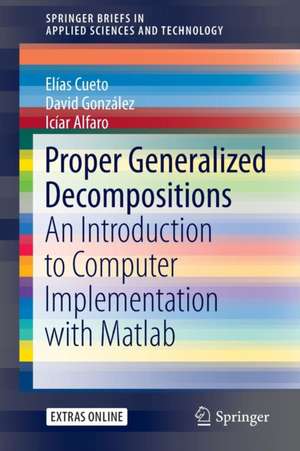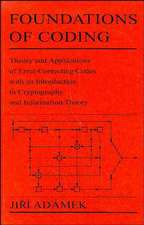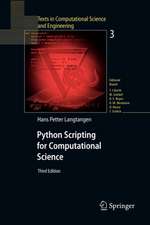Proper Generalized Decompositions: An Introduction to Computer Implementation with Matlab: SpringerBriefs in Applied Sciences and Technology
Autor Elías Cueto, David González, Icíar Alfaroen Limba Engleză Paperback – 10 mar 2016
Proper Generalized Decomposition (PGD) is a method for numerical simulation in many fields of applied science and engineering. As a generalization of Proper Orthogonal Decomposition or Principal Component Analysis to an arbitrary number of dimensions, PGD is able to provide the analyst with very accurate solutions for problems defined in high dimensional spaces, parametric problems and even real-time simulation.
Din seria SpringerBriefs in Applied Sciences and Technology
-
 Preț: 380.29 lei
Preț: 380.29 lei - 17%
 Preț: 360.34 lei
Preț: 360.34 lei - 20%
 Preț: 386.12 lei
Preț: 386.12 lei -
 Preț: 380.07 lei
Preț: 380.07 lei -
 Preț: 377.95 lei
Preț: 377.95 lei -
 Preț: 382.32 lei
Preț: 382.32 lei -
 Preț: 376.59 lei
Preț: 376.59 lei -
 Preț: 379.09 lei
Preț: 379.09 lei -
 Preț: 378.12 lei
Preț: 378.12 lei - 20%
 Preț: 293.83 lei
Preț: 293.83 lei -
 Preț: 344.90 lei
Preț: 344.90 lei -
 Preț: 321.36 lei
Preț: 321.36 lei -
 Preț: 264.79 lei
Preț: 264.79 lei -
 Preț: 344.90 lei
Preț: 344.90 lei -
 Preț: 356.46 lei
Preț: 356.46 lei -
 Preț: 382.95 lei
Preț: 382.95 lei -
 Preț: 355.66 lei
Preț: 355.66 lei -
 Preț: 479.67 lei
Preț: 479.67 lei -
 Preț: 415.18 lei
Preț: 415.18 lei -
 Preț: 444.52 lei
Preț: 444.52 lei - 20%
 Preț: 301.86 lei
Preț: 301.86 lei -
 Preț: 409.43 lei
Preț: 409.43 lei - 20%
 Preț: 322.17 lei
Preț: 322.17 lei -
 Preț: 355.49 lei
Preț: 355.49 lei - 15%
 Preț: 462.51 lei
Preț: 462.51 lei -
 Preț: 377.18 lei
Preț: 377.18 lei -
 Preț: 355.93 lei
Preț: 355.93 lei -
 Preț: 382.95 lei
Preț: 382.95 lei -
 Preț: 378.12 lei
Preț: 378.12 lei -
 Preț: 378.12 lei
Preț: 378.12 lei -
 Preț: 380.07 lei
Preț: 380.07 lei -
 Preț: 380.07 lei
Preț: 380.07 lei - 20%
 Preț: 326.28 lei
Preț: 326.28 lei -
 Preț: 312.68 lei
Preț: 312.68 lei -
 Preț: 356.43 lei
Preț: 356.43 lei -
 Preț: 412.30 lei
Preț: 412.30 lei - 20%
 Preț: 225.31 lei
Preț: 225.31 lei -
 Preț: 378.12 lei
Preț: 378.12 lei -
 Preț: 376.59 lei
Preț: 376.59 lei -
 Preț: 195.87 lei
Preț: 195.87 lei -
 Preț: 376.22 lei
Preț: 376.22 lei - 20%
 Preț: 324.64 lei
Preț: 324.64 lei - 20%
 Preț: 288.73 lei
Preț: 288.73 lei -
 Preț: 377.57 lei
Preț: 377.57 lei -
 Preț: 261.91 lei
Preț: 261.91 lei -
 Preț: 381.98 lei
Preț: 381.98 lei -
 Preț: 273.64 lei
Preț: 273.64 lei -
 Preț: 410.87 lei
Preț: 410.87 lei -
 Preț: 379.68 lei
Preț: 379.68 lei -
 Preț: 374.30 lei
Preț: 374.30 lei
Preț: 377.35 lei
Nou
Puncte Express: 566
Preț estimativ în valută:
72.21€ • 78.68$ • 60.84£
72.21€ • 78.68$ • 60.84£
Carte tipărită la comandă
Livrare economică 23 aprilie-07 mai
Preluare comenzi: 021 569.72.76
Specificații
ISBN-13: 9783319299938
ISBN-10: 331929993X
Pagini: 116
Ilustrații: XII, 96 p. 20 illus., 1 illus. in color.
Dimensiuni: 155 x 235 x 6 mm
Greutate: 0.16 kg
Ediția:1st ed. 2016
Editura: Springer International Publishing
Colecția Springer
Seria SpringerBriefs in Applied Sciences and Technology
Locul publicării:Cham, Switzerland
ISBN-10: 331929993X
Pagini: 116
Ilustrații: XII, 96 p. 20 illus., 1 illus. in color.
Dimensiuni: 155 x 235 x 6 mm
Greutate: 0.16 kg
Ediția:1st ed. 2016
Editura: Springer International Publishing
Colecția Springer
Seria SpringerBriefs in Applied Sciences and Technology
Locul publicării:Cham, Switzerland
Cuprins
Introduction.- 2 To begin with: PGD for Poisson problems.- 2.1 Introduction.- 2.2 The Poisson problem.- 2.3 Matrix structure of the problem.- 2.4 Matlab code for the Poisson problem.- 3 Parametric problems.- 3.1 A particularly challenging problem: a moving load as a parameter.- 3.2 The problem under the PGD formalism.- 3.2.1 Computation of S(s) assuming R(x) is known.- 3.2.2 Computation of R(x) assuming S(s) is known.- 3.3 Matrix structure of the problem.- 3.4 Matlab code for the influence line problem.- 4 PGD for non-linear problems.- 4.1 Hyperelasticity.- 4.2 Matrix structure of the problem.- 4.2.1 Matrix form of the term T2.- 4.2.2 Matrix form of the term T4.- 4.2.3 Matrix form of the term T6.- 4.2.4 Matrix form for the term T8.- 4.2.5 Matrix form of the term T9.- 4.2.6 Matrix form of the term T10.- 4.2.7 Final comments.- 4.3 Matlab code.- 5 PGD for dynamical problems.- 5.1 Taking initial conditions as parameters.- 5.2 Developing the weak form of the problem.- 5.3 Matrix form of the problem.- 5.3.1 Time integration of the equations of motion.- 5.3.2 Computing a reduced-order basis for the field of initial conditions.- 5.3.3 Projection of the equations onto a reduced, parametric basis.- 5.4 Matlab code.- References.- Index.
Recenzii
“This book provides a brief introduction to Proper Generalized Decompositions (PGD), with strong emphasis on computational aspects. The book discusses the implementation of PGD for the Poisson problem, parameter-dependent problems, linear-elasticity, and dynamical problems. For every problem, matrix assembly is developed and Matlab routines are presented.” (Dante Kalise, Mathematical Reviews, July, 2017)
Textul de pe ultima copertă
This book is intended to help researchers overcome the entrance barrier to Proper Generalized Decomposition (PGD), by providing a valuable tool to begin the programming task. Detailed Matlab Codes are included for every chapter in the book, in which the theory previously described is translated into practice. Examples include parametric problems, non-linear model order reduction and real-time simulation, among others.
Proper Generalized Decomposition (PGD) is a method for numerical simulation in many fields of applied science and engineering. As a generalization of Proper Orthogonal Decomposition or Principal Component Analysis to an arbitrary number of dimensions, PGD is able to provide the analyst with very accurate solutions for problems defined in high dimensional spaces, parametric problems and even real-time simulation.
Proper Generalized Decomposition (PGD) is a method for numerical simulation in many fields of applied science and engineering. As a generalization of Proper Orthogonal Decomposition or Principal Component Analysis to an arbitrary number of dimensions, PGD is able to provide the analyst with very accurate solutions for problems defined in high dimensional spaces, parametric problems and even real-time simulation.
Caracteristici
First PGD book intended as a manual in the basics of the method Only available reference that includes Matlab code to ease the process Covers some of the most popular aspects of the technique, particularly real-time simulation Includes supplementary material: sn.pub/extras












